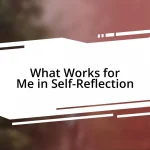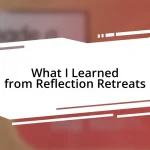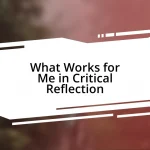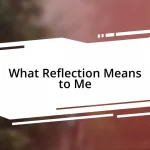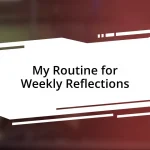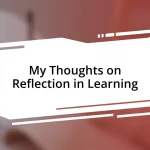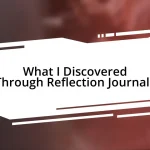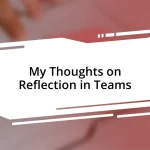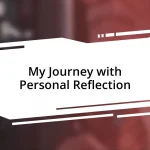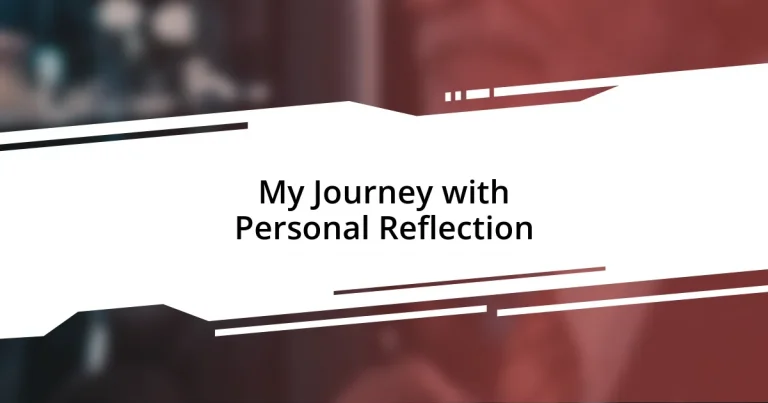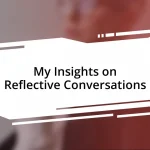Key takeaways:
- Personal reflection fosters self-awareness, emotional processing, and accountability, enabling individuals to better understand their motivations and improve their decision-making skills.
- Techniques such as journaling, mindfulness meditation, and guided reflection with others are effective methods for enhancing introspection and uncovering insights.
- Setting specific goals and timeframes for reflection can create a structured approach, facilitating personal growth and clarity in aspirations.
- Measuring progress through tracking emotions, challenges, and gratitude helps recognize growth over time, reinforcing the transformative power of self-reflection.
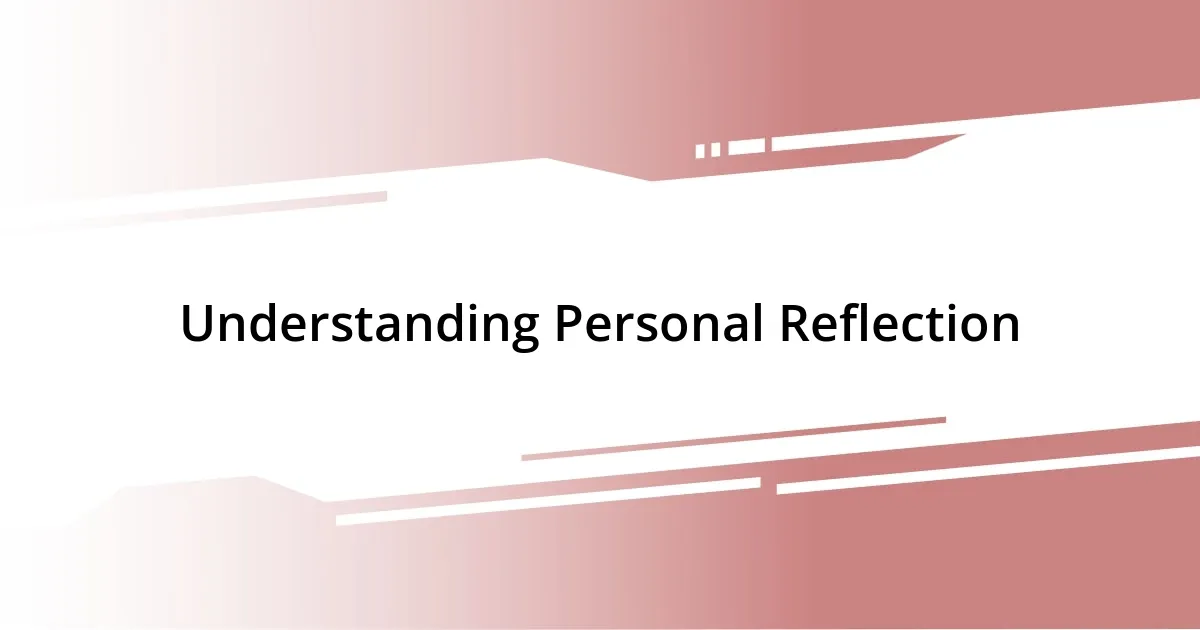
Understanding Personal Reflection
Personal reflection is that quiet moment when we pause to look inward. I remember sitting alone in a park, overwhelmed by life’s demands. The stillness around me urged me to think deeply about my choices and feelings, and in that peaceful environment, I realized how rarely I assessed what truly mattered in my life.
Engaging in personal reflection allows us to uncover layers within ourselves that often go unnoticed. I once found my journal filled with thoughts about a job I didn’t enjoy, and it struck me: why had I accepted that position in the first place? That question led me to explore my motivations and fears, ultimately guiding me toward a career path that aligned with my passions.
Reflecting on our experiences can be enlightening but also uncomfortable, as it might stir up emotions we’d rather avoid. Have you ever considered how a seemingly small decision could ripple through your life? I recall the time I chose to distance myself from toxic relationships. It was a hard choice, but reflecting on my happiness reminded me that sometimes, letting go is not just necessary; it’s liberating.
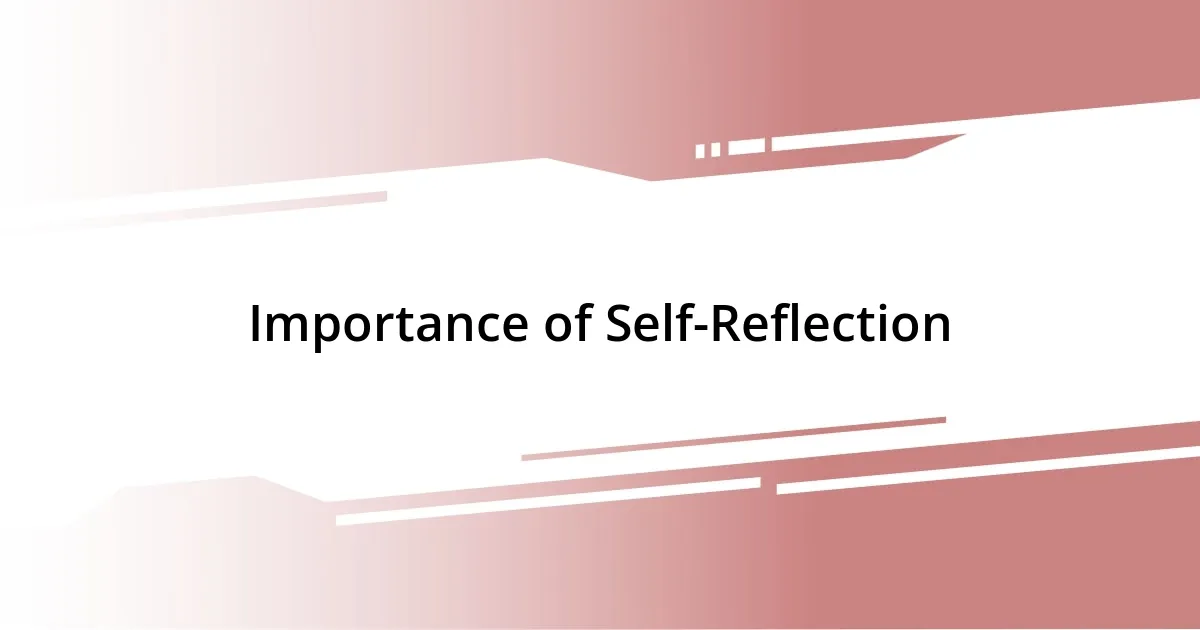
Importance of Self-Reflection
Self-reflection is vital for personal growth and understanding. I can’t stress enough how the moments I’ve spent in introspection have reshaped my outlook on life. There was a time when I felt stuck in a cycle of negative thoughts. It wasn’t until I sat down one weekend to really think about what was holding me back that I recognized patterns from my childhood that I needed to confront.
Here are some key reasons why self-reflection matters:
- Promotes self-awareness: It helps me understand my strengths and weaknesses. Recognizing them allows me to make informed choices.
- Facilitates emotional processing: By reflecting on my feelings, I’ve learned to navigate complex emotions. This has fostered resilience and a healthier mindset.
- Encourages personal accountability: Reflecting on my actions enables me to take responsibility for my choices, promoting growth and change.
- Enhances decision-making skills: I find that taking a moment to reflect often leads to more thoughtful and better choices, rather than impulsive decisions.
- Fosters creativity: When I clear my mind through reflection, I often discover new ideas and solutions that were previously hidden beneath the clutter of daily life.
The act of looking inward isn’t just about recognizing problems; it’s about creating a clearer path forward. I remember a particularly introspective afternoon, where I felt a sense of weight lifting as I acknowledged old habits that no longer served me. Reflecting on that has empowered me to embrace change, and trust me, it’s a journey worth taking.
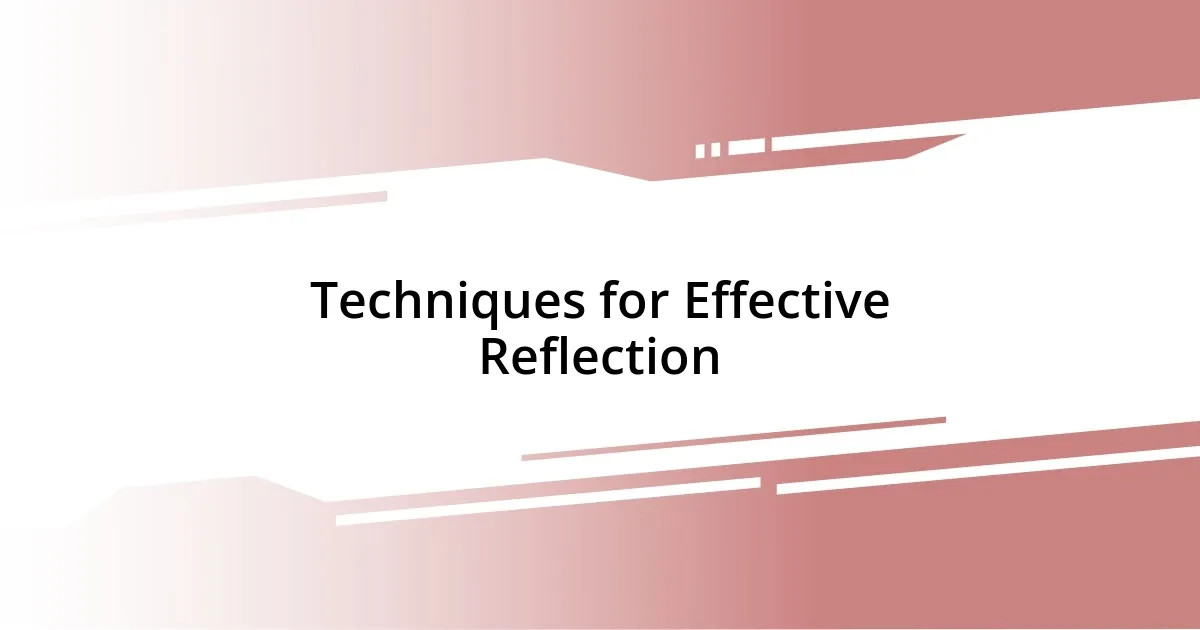
Techniques for Effective Reflection
When it comes to effective personal reflection, I’ve found that journaling stands out as one of the most impactful techniques. There’s something incredibly cathartic about putting pen to paper. I remember the first time I wrote about my goals and dreams—I felt an exhilarating mix of vulnerability and clarity that set the tone for my journey ahead. It’s like capturing a snapshot of my thoughts and feelings, allowing me to track my evolution over time.
Another technique I highly recommend is engaging in mindfulness meditation. I recall a time when I was muddled with thoughts that felt too overwhelming to sort through. Taking just ten minutes to focus on my breath brought a transformative sense of calm. Each deep inhale seemed to create space in my mind for reflection, helping me untangle my emotions and foster self-awareness. It’s amazing how a little stillness can lead to profound insights.
Lastly, I’ve dived into guided reflection through conversations with a trusted friend or mentor. Sharing my experiences and hearing someone else’s perspective has often illuminated paths I hadn’t considered. There was a moment when a close friend pointed out patterns in my behavior during our chats, leading to breakthroughs in my understanding of myself. It’s a reminder that sometimes we need an outside perspective to see our own blind spots clearly.
| Technique | Benefits |
|---|---|
| Journaling | Encourages emotional expression and helps track personal growth. |
| Mindfulness Meditation | Brings clarity and calmness, fostering deeper self-awareness. |
| Guided Reflection with Others | Provides new perspectives and insights from conversations. |
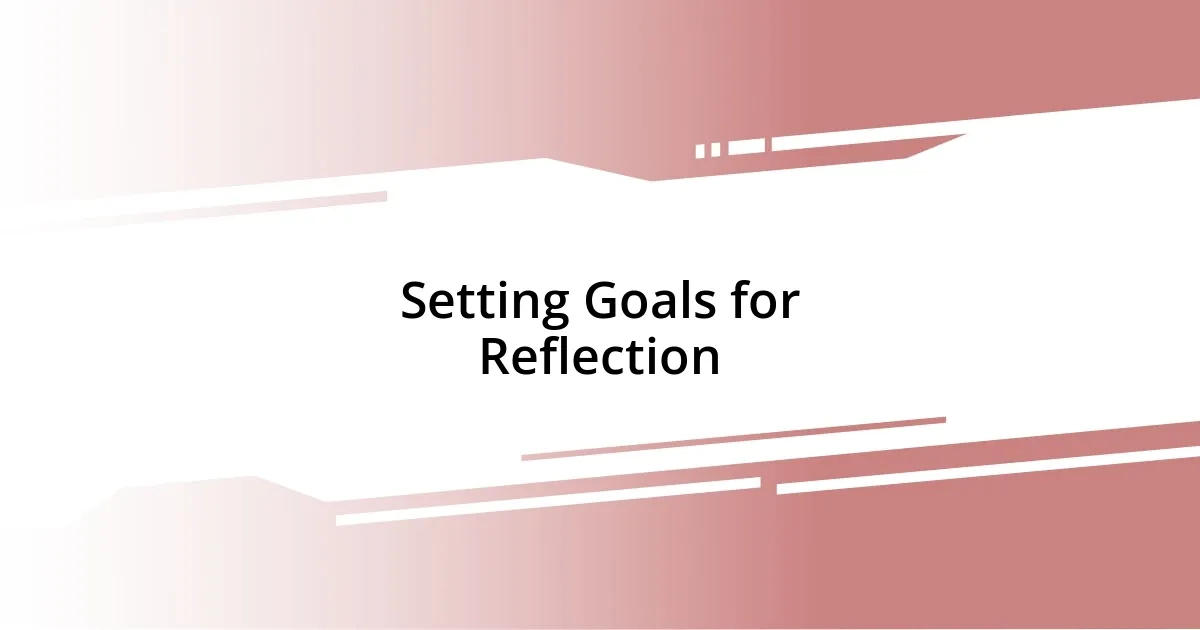
Setting Goals for Reflection
Setting goals for reflection is an essential step in my personal growth journey. I vividly remember sitting down and asking myself, “What do I truly want to gain from this reflection process?” By pinpointing areas like enhancing my self-awareness or improving my emotional resilience, I created a roadmap that guided my introspection. It’s like having a compass; knowing where I wanted to go made the journey more meaningful.
One strong goal I set for myself was to better understand my emotional triggers. I found it enlightening to establish specific moments from my past that lingered in my mind. During one reflective session, I focused on a difficult relationship and how it shaped my interactions today. This process was sometimes uncomfortable but incredibly rewarding. It was a chance to confront the emotions one by one and learn what they meant for my current choices.
Finally, I believe that setting timeframes for reflection adds structure to the experience. I started dedicating Sunday evenings to this practice, allowing me to unwind and assess the week’s events. So, I ask you: when was the last time you carved out intentional time for reflection? That simple habit helped me gain clarity about my aspirations and intentions moving forward, providing a refreshing reset that I looked forward to each week.
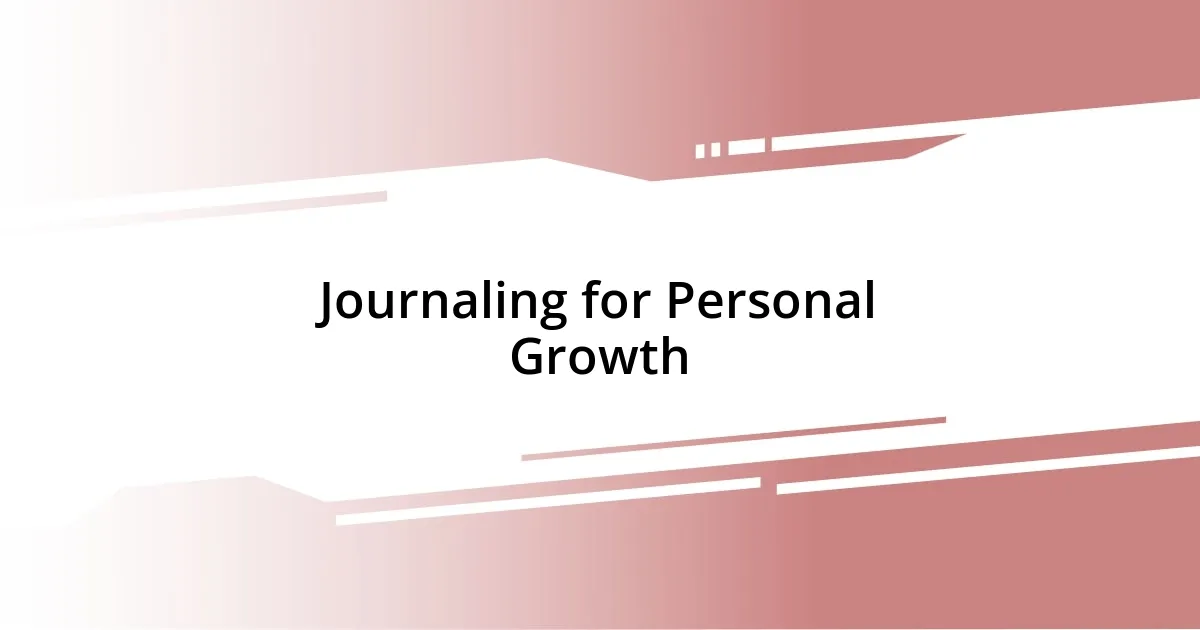
Journaling for Personal Growth
Journaling has been a game-changer in my personal growth journey. There have been nights when I poured my heart out onto the pages, detailing moments of frustration or joy. It always amazed me how, after writing, my thoughts felt so much clearer and more manageable. Have you ever tried to unpack a heavy emotion? Writing down my feelings allowed me to see the connection between my experiences and my reactions, which helped me grow immensely.
What I love most about journaling is its ability to capture my evolving mindset. Reflecting on past entries is like revisiting old chapters of my life. I can often pinpoint the pivotal moments that reshaped my understanding of myself. There was a time I noted down my fears about a career change, and reading that now makes me appreciate how far I’ve come. It’s a poignant reminder of how much our thoughts can shift with time and effort.
Sometimes, I challenge myself to write about what I want to become. I remember asking myself, “How do I envision my ideal self?” That simple prompt led me to explore dreams that I had buried beneath the surface. Unraveling my aspirations in writing not only fueled my motivation but also made me hold myself accountable. It’s curious how articulating those dreams stirs something inside us—don’t you agree? Each word I wrote brought me one step closer to becoming the person I aspire to be.
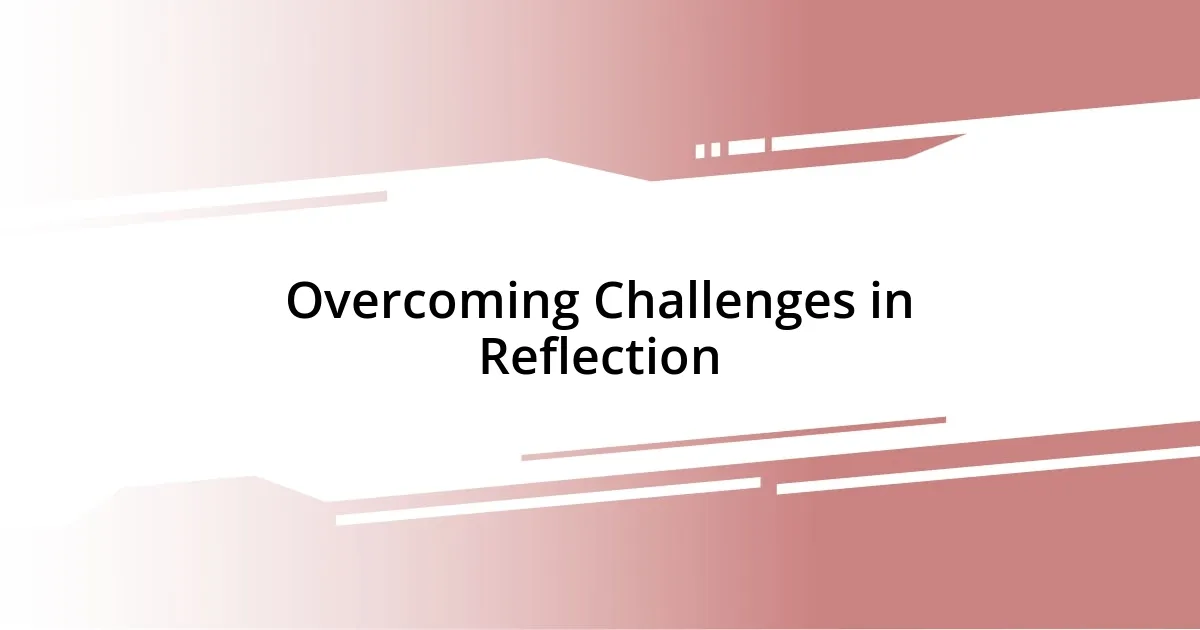
Overcoming Challenges in Reflection
Overcoming the hurdles in personal reflection can be a daunting task. I recall a period when I felt stuck, staring at a blank journal page, unsure of what to write or where to begin. It often felt like my thoughts were jumbled in my mind, and I questioned, “What’s the point of this?” But I learned that even the act of pinpointing that confusion was a valuable first step. Embracing my uncertainty opened the door to deeper insights rather than hindering me.
As I continued my journey, I encountered moments when reflecting on painful experiences felt overwhelming. There was one Saturday, as I revisited a challenging breakup, emotions surged uncontrollably. It made me wonder, “Why put myself through this?” But sitting in those feelings transformed my understanding of vulnerability. I realized that confronting pain was part of healing and growth. This uncomfortable space became an avenue for recognizing patterns in my behavior, ultimately guiding me toward healthier relationship choices.
In my experience, distractions often interrupted my reflective practice. I remember a time I tried to write while surrounded by noise—my family’s laughter in the background made focusing nearly impossible. It led me to ask myself, “How can I create an environment that fosters reflection?” So, I began experimenting with different spaces and times. Finding a quiet corner or early morning calm changed everything. Now, I cherish those moments, as they allow me to connect more deeply with my thoughts, making reflection not just a task, but a treasured part of my week.
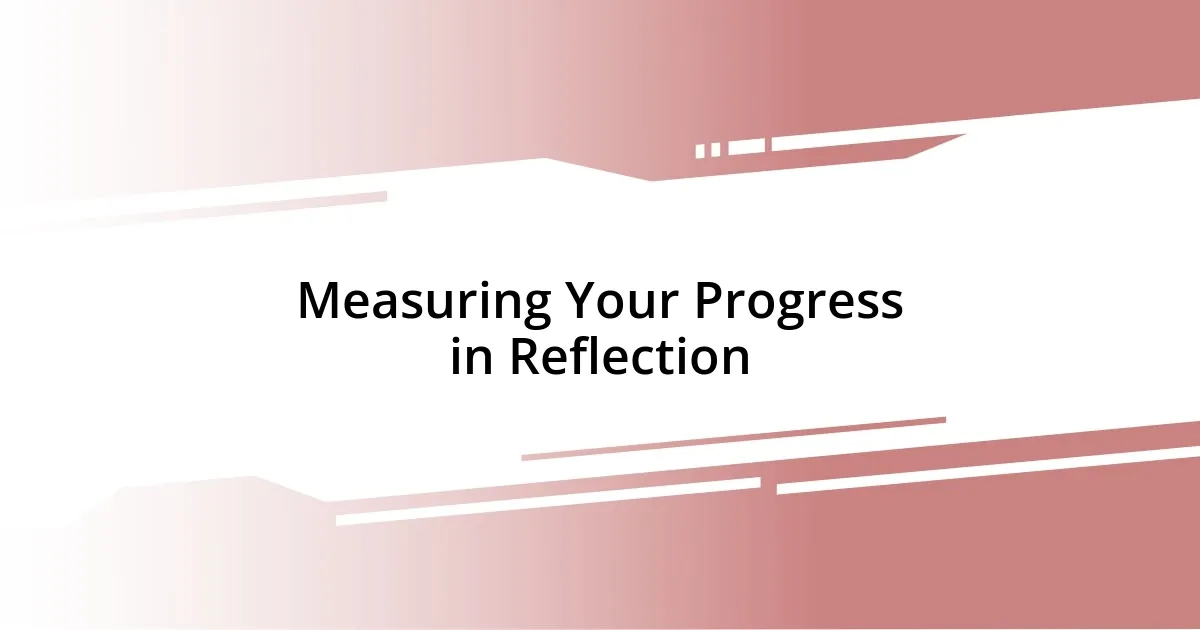
Measuring Your Progress in Reflection
Measuring progress in reflection can sometimes feel like trying to catch smoke with your bare hands. A few months ago, I reviewed my old journal entries and felt a rush of nostalgia as I traced my thoughts on specific life decisions. Those words stirred feelings of pride as I realized how far I’d come. Have you ever felt that sense of achievement when looking back at your own reflections? It’s a transformative experience that reminds me that growth isn’t just about moving forward but also recognizing how far we’ve traveled.
One of the more profound methods I’ve found effective is setting specific goals for my reflection sessions. Instead of just writing about my day, I now ask myself targeted questions, like “What challenge did I face today, and how did I handle it?” Tracking my responses over time has been eye-opening. It’s like watching a movie of my life, where I can spot recurring themes and patterns I’d otherwise overlook. Does it feel like a bit of a treasure hunt, trying to decipher your own narrative?
I also love using milestone markers to indicate my progress. For instance, I started a gratitude section in my journal where I note three things I’m thankful for each week. When I reread these entries after a few months, it paints a beautiful picture of my emotional growth. It’s surprising how a simple practice can illuminate shifts in your mindset. Have you ever tried tracking your appreciation? It can be a refreshing way to measure how your perspective has evolved. Each entry serves as a stepping stone, reminding me of the positive facets of my journey amid the more challenging reflections.

